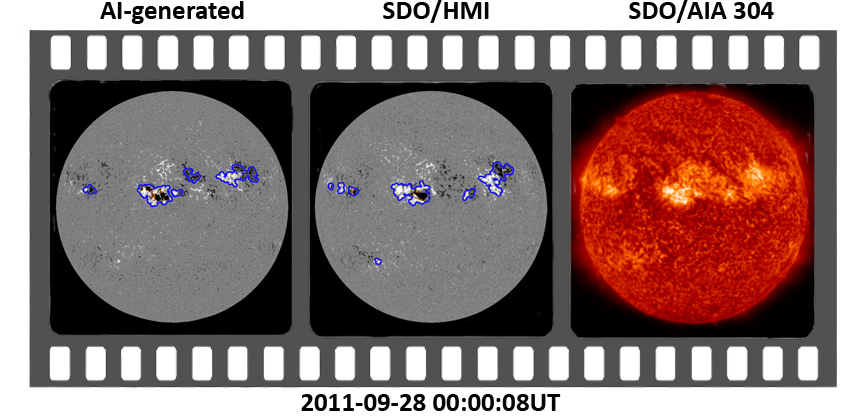Researchers at Queen’s explore the limitations of AI in predicting the solar magnetic field
Researchers from Queen’s University Belfast have explored the reliability and limitations of state-of-the-art artificial intelligence (AI) techniques in predicting the global solar magnetic field.

Researchers from Queen’s University Belfast have explored the reliability and limitations of state-of-the-art artificial intelligence (AI) techniques in predicting the global solar magnetic field.
The research and findings of the study have been published in the journal, Nature Astronomy today (Friday,12 February) in collaboration with academics from the University of Sheffield, Chinese Academy of Science, Aberystwyth University, and University of Science and Technology of China.
Recently, a number of novel AI techniques have been introduced for a variety of purposes in the area of solar physics and space weather forecasting.
Dr Jiajia Liu, Research Fellow at the Astrophysics Research Centre (ARC) of the School of Mathematics and Physics at Queen’s, who was one of the lead authors on the research said: “By performing this innovative and detailed analysis, we have addressed the critical question of the limitations AI models have in predicting the solar magnetic field.
“An advanced AI model has been previously proposed to generate the photospheric magnetic fields observed by NASA’s SDO satellite mission using observations of the solar chromosphere with temperatures at ~50,000 degrees as the only inputs.
“Promising results have been achieved with a high level of cross-correlation between the total unsigned magnetic flux of the observed and the generated magnetic fields of the visible surface of the Sun, called the solar photosphere.
“Our study suggested that its performance was not as expected in predicting other parameters including the net flux and the polarity reversion lines, which are vital in space weather predictions.
“AI is an advanced and rapidly developing technique which has a wide range of applications. However, we all must be aware of the limitations, especially when applying such techniques to scientific research. Without considering the fundamental mathematics and physics, it is not possible to achieve reliable results even if one is using the most advanced techniques.”
The photospheric magnetic fields of our star the Sun play a fundamental role in forming e.g. sunspots, or the very dynamic regions called active regions in the solar atmosphere.
These regions are also believed to host the onset of coronal mass ejections (CMEs) and one of the largest and most energetic explosions in our Solar System, the flares.
These gigantic eruptive features are the most dominant drivers of severe space weather events.
Space weather is a term that refers to the physical (e.g., magnetic and plasma) conditions in the space near the Earth, which determines the functioning and safety of a wide range of modern high-tech based facilities including airplanes, satellites, GPS, power grids and oil pipelines.
Dr Jiajia Liu added: “I joined the ARC in May 2020, and I was so lucky to be able to continue my research during these unprecedented and difficult times, thanks to the support from across the School, especially from Professors Mihalis Mathioudakis, Francis Keenan and Dr David Jess with their STFC and Leverhulme Trust grants.”
Professor Mihalis Mathioudakis, Head of Research for ARC commented: “This research has presented wonderful results and shows how important our support is to early career researchers in conducting their research and delivering cutting-edge results, especially during the global pandemic.” The full paper is available here - https://dx.doi.org/10.1038/s41550-021-01310-6.
Ends
Media
For media inquiries please contact Queen’s Communications Office on comms.office@qub.ac.uk
Notes to editors: The research paper is available here: https://dx.doi.org/10.1038/s41550-021-01310-6.
Images are available.
Dr Jiajia Liu (first author, Research Fellow at ARC, Queen’s University Belfast),
Dr Yimin Wang (first author, University of Sheffield),
Dr Xin Huang (Chinese Academy of Science),
Dr Marianna B. Korsos (postdoc at Aberystwyth University),
Dr Ye Jiang (University of Sheffield),
Professor Yuming Wang (University of Science and Technology of China),
Professor Robertus Erdélyi (corresponding author, University of Sheffield).
